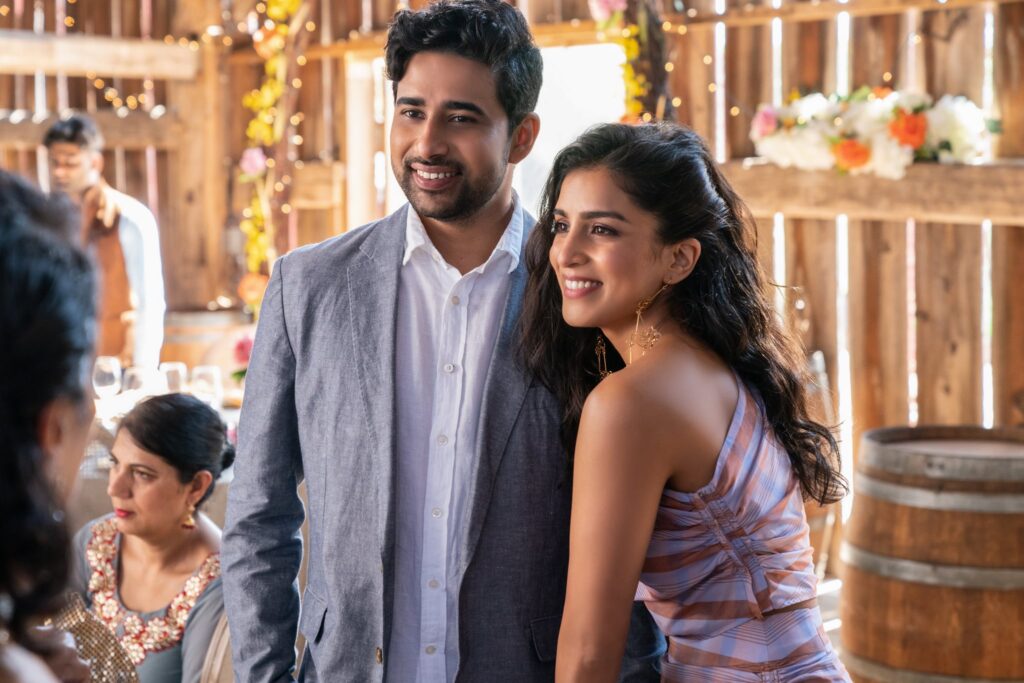Wedding Season, helmed by Tom Dey and streaming on Netflix, is a romcom set amongst the Indian diaspora based in New Jersey. Starring Pallavi Sharda and Suraj Sharma, the film is formulaic, largely predictable and makes for light-weight, undemanding viewing at best. It is lifted a notch, though, by the lead pair’s solid chemistry and their fine performances.
As the film’s title says, the film is spread over a summer where several ‘desi’ weddings take place. Asha Maurya (Pallavi Sharda) and Ravi Shankar Shah (Suraj Sharma) are both being pressurised by their parents – more specifically her mother (Veena Sood) and his father (Manoj Sood) – to find a good suitable match. The two put up dressed up profiles of their children on an online dating site. Blackmailed by her mother into meeting Ravi and attending all the weddings taking place over the summer, Asha, driven by her career in Microfinance, wherein she raises funds to financially help backward women in South Asia, convinces Ravi, a DJ, into becoming her pretend date for the season. This so that their parents and others from the Indian communities would lay off them and stop trying to match them with others. Ravi goes along with the scheme reluctantly but as they meet and interact over the various weddings, they begin to warm up towards each other…
Wedding Season, a Netflix production, faithfully follows the trajectory of the romcom – a not so great beginning between boy and girl, gradually finding out the other is not too bad, them falling in love, a crisis and a final reconciliation. In that sense, it is foreseeable to its happy ending and is rather old wine in a not so new bottle. Director Dey and writer Shivani Srivastava take recourse to enough safe clichés and stereotyping within the Indian community to bring out some obvious and familiar humor. That said, the film does have its occasional share of perceptive moments as it explores generation gaps and parents who stifle their children, albeit well-meaningly, to follow the rules rather then letting them be. This leads to both generations lying and being devious with each other. While Asha and Ravi fake date, Ravi’s father hides the fact that Ravi, a spelling bee protege, dropped out of MIT to find himself in music while Asha’s mother describes the workaholic Asha as a simple, kitchen-friendly, traditional girl that Asha is anything but.
I’m a little confused on the film’s take. While ultimately both sets of parents realize it’s best to let their children lead their lives, the central love story happens only due to the forced arranged meeting of Ravi and Asha, engineered by the the parents. Perhaps, it is to open our eyes that both generations need to learn to give and take a little from each other. Especially in the ‘Indian’ context. The film also gives a token nod to inter-racial issues (the first wedding is an Indian-Jewish one), a Hindu-Muslim marriage not attended by the parents of the groom and bride and through Asha’s mother, it even makes a reference to caste. Asha’s sister Priya’s wedding too is to a white American. But it all stays on the surface as the film focusses almost all its attention on its admittedly likeable leads.
While the relationship between Asha and Ravi works well enough, there are enough bits that, sadly, fall totally flat in Wedding Season. The entire track of Asha’s would-be brother-in-law, Nick (Sean Kleier), trying to prove himself to be more Indian than Asha and her family to ingratiate himself among them, is a no-no and rather unfunny. Once Asha and Ravi hit the bottom in their relationship, the film clunkily moves on to its inevitable happy conclusion.
It is Pallavi Sharda and Suraj Sharma, who make us invest somewhat in the film and in their characters. The two share a good rapport, play off each other perfectly and give well-rounded performances that are aided by some smart dialogue exchanges. Of the supporting cast, Rizwan Manji stands out as Asha’s supportive father, who migrated to the US for a better life. He creates a nice tender moment with Asha towards the end when she is at the crossroad of a life-changing opportunity. Arianna Afsar too contributes her bit as Asha’s younger sister, Priya, about to be married to Nick. Veena Sood as Asha’s mother and Manoj Sood as Ravi’s father are unable to always keep their balance between the thin lines of stereotyping and appearing credibly fleshed out as overacting desi parents.
Technically, the film is adequate. The costume person, in particular, has some fun designing enough colourful attire for the characters to wear through the several weddings.
Overall Wedding Season, makes for easy and pleasant viewing. But it is unable to break its shackles of been there-seen that and that is what ultimately lets the film down.
English, Romcom, Color


